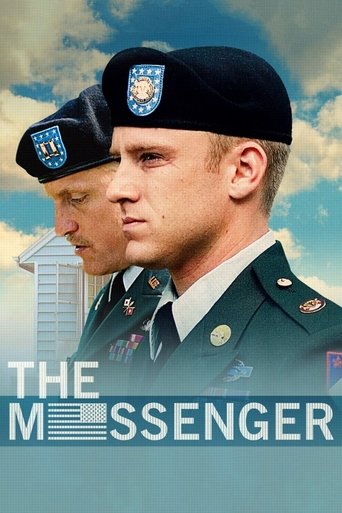The Scars of War Will Last Forever.
"The Messenger," a poignant 2009 drama crafted by Oscilloscope in the United States, delves deep into the emotional turmoil faced by soldiers returning from war. Directed by Oren Moverman and co-written with Alessandro Camon, the film stars Ben Foster as Staff Sergeant Will Montgomery and Woody Harrelson as Captain Tony Stone, two soldiers assigned to the Casualty Notification Office. Tasked with delivering news of fallen soldiers to their families, the film intricately explores the psychological impact of their duties on both the messengers and the bereaved. The raw and unflinching portrayal of grief, duty, and human connection earned the film critical acclaim, including an Academy Award nomination for Best Original Screenplay. Set against the backdrop of a nation grappling with the ongoing effects of war, "The Messenger" captures the nuances of human emotion with stark realism. The film's narrative weaves through the lives of Will and Tony as they navigate the delicate balance between professional detachment and personal empathy. Will's struggle with his own demons, including a strained relationship with his ex-girlfriend and a burgeoning romance with a widow he meets on duty, adds layers to his character, making his journey one of both external duty and internal conflict. The chemistry between Foster and Harrelson, coupled with their powerful performances, brings an authenticity that resonates deeply with the audience. The film's visual style, characterized by its muted tones and intimate camera work, complements the somber mood and emphasizes the gravity of the soldiers' mission. Cinematographer Bobby Bukowski's approach enhances the emotional weight of each scene, particularly during the notification sequences, where the camera lingers on the faces of the families, capturing their raw, unfiltered reactions. This visual storytelling, combined with the film's sound design, creates an immersive experience that underscores the film's themes of loss, resilience, and the search for meaning amidst chaos. "The Messenger" stands out not only for its compelling narrative and strong performances but also for its thoughtful exploration of the ripple effects of war on individuals and society. By focusing on the often-overlooked role of casualty notification officers, the film sheds light on the human cost of conflict and the importance of compassion and understanding in the face of tragedy. Its impact is felt long after the credits roll, leaving viewers with a profound appreciation for the sacrifices made by soldiers and their families, and a deeper understanding of the complexities of grief and healing.
Año2009
Página principal
Presupuesto6500000$
Duración113 minuto
Ingresos1595417$
GénerosDramaRomance
Países de producciónUnited States of America

